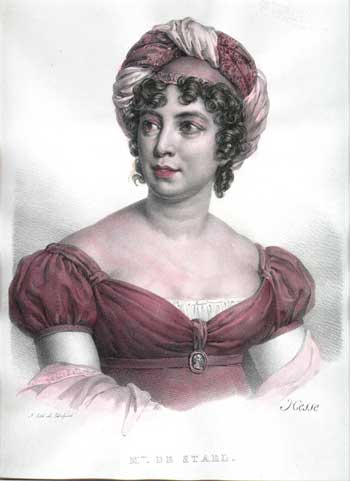Liberty Matters
Arenas for the Cultivation of Sociability and “Enthusiasm”
 I would like to pick up a thread of the conversation suggested by Benjamin Hoffmann, namely, the aristocratic undertone of Staël's discussion of "enthusiasm" and the contrast with plebian "selfishness." Staël did not argue, of course, that enthusiasm and the other positive sentiments were restricted to the aristocratic class. Rather, she fervently hoped that these "dispositions of the soul" would spread broadly in society to counter selfish passions and "fanaticism." Nonetheless, this undertone points to an element of Staël's position that poses an important question concerning any potential application of her political thought today.
I would like to pick up a thread of the conversation suggested by Benjamin Hoffmann, namely, the aristocratic undertone of Staël's discussion of "enthusiasm" and the contrast with plebian "selfishness." Staël did not argue, of course, that enthusiasm and the other positive sentiments were restricted to the aristocratic class. Rather, she fervently hoped that these "dispositions of the soul" would spread broadly in society to counter selfish passions and "fanaticism." Nonetheless, this undertone points to an element of Staël's position that poses an important question concerning any potential application of her political thought today.Staël assumed that certain arenas of sociability were more likely to encourage enthusiasm and other positive sentiments than others. The most favored locations for her were, I believe, salons, especially salons of the late-Old Regime and early years of the Revolution. For Staël, these were the model locations for the gathering of people who might disagree about political, scientific, and aesthetic issues, but who related to each other without rancor or physical conflict. They were the locus classicus of an open communication of ideas, where an intelligent elite could discuss and mediate their differences. In a notable passage in Considérations sur la Révolution française, she wrote:
Foreigners are not able to conceive the charm and brilliance of Parisian society, if they have not seen France twenty years ago. One is able to say with truth that never has a society been at the same time as brilliant and serious as during the three or four first years of the revolution, running from 1788 to the end of 1791. As public affairs were still in the hands of the best people, all vigor, liberty, and grace of the old politesse, were united in the same individuals.[101]
There is a sense of nostalgic affection here, I believe, one that comes from Staël's perception that the world in which these salons existed had disappeared. She pointed out that under Napoleon, salons had been largely replaced by grand official ceremonies that were intellectually deadening. Even the salons that remained, she observed, had become venues where suspicion, careerism, and venal passions prevailed. As she put it in a letter to Benjamin Constant, high society had become "a labyrinth of interests and ambitions."[102] She was worried that the refined sociability and reasoned deliberation that salons represented were gone, replaced by official ceremonies, bad manners, vulgarity, and fanaticism.
Bronislaw Baczko has argued that, for Staël, the salon was a utopian space where aesthetics and politics made a perfect mix.[103] It was the arena where she imagined it was possible to detach the urbanity, good taste, and sociability – that is, the moeurs – of the Old Regime and transfer them to the republican postrevolutionary era. In short, it was the privileged location for a melding of republican politics and aristocratic culture.
With their decline, the question becomes (to return to the thought experiment suggested by Benjamin Hoffmann): "Where in modern society can such positive sentiments be nourished?" Catriona Seth has suggested that, for Staël, one answer was to encourage cosmopolitanism. This is persuasive, and it would clearly help. I am not convinced, however, that this would be sufficient to overcome the political rancor and xenophobic nationalism of our own era. (Nor was it sufficient in Staël's own era.)
When I contemplate potential answers, my mind wanders to Tocqueville's view of the importance of local politics, of associations, of judicial traditions (the jury system in America, for example). And I think of Durkheim's focus on the social solidarity created by professional groups, though I do not believe (as he did) that these groups would be any more unselfish than traditional groups. What Staël and Tocqueville shared was a belief that an important part of the answer was the arena of modern representative politics, where the give-and-take of incommensurable interests could take place in a manner that could lead to compromise. What they also shared, however, was an inattentiveness to dimensions that, in my opinion, are of equal importance: the issue of "class," the problems created by extreme economic inequality. Perhaps the privileged backgrounds of French liberals like Staël and Tocqueville made them insensitive to such issues. This might be the most important "aristocratic undertone" of their thought.
Endnotes
[101.] Germaine de Staël, Considérations sur la Révolution Françaises, seconde partie, chapitre XVII (Paris: Charpentier, 1862), t. 1, p. 299.
[102.] Germaine de Staël to Benjamin Constant (27 October 1815), cited by Steven Kale, French Salons: High Society and Political Sociability from the Old Regime to the Revolution of 1848 (Baltimore: Johns Hopkins University Press, 2004), p. 100.
[103.] Bronislaw Baczko, Politiques de la Révolution française (Paris: Gallimard, 2008).
Copyright and Fair Use Statement
“Liberty Matters” is the copyright of Liberty Fund, Inc. This material is put on line to further the educational goals of Liberty Fund, Inc. These essays and responses may be quoted and otherwise used under “fair use” provisions for educational and academic purposes. To reprint these essays in course booklets requires the prior permission of Liberty Fund, Inc. Please contact oll@libertyfund.org if you have any questions.